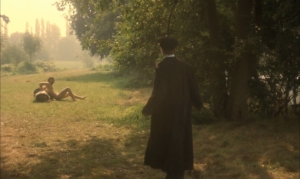Contributor(s): Shared on: Categories: Tags: | Contribute a translation | Source (English) |
|---|
|
O Thou,
whose light is about me
and within me
and to whom all things are present,
help me this day to keep my life pure in Thy sight. | |
Suffer me not
by any lawless act of mine
to befoul any innocent life
or add to the shame
and hopelessness
of any erring one
that struggles faintly against sin. | |
Grant me a steadfast scorn for pleasure bought by human degradation. | |
May no reckless word or wanton look from me
kindle the slow fires of wayward passion
that will char and consume the divine beauties of any soul. | |
Give me grace to watch over the imaginations of my heart,
lest in the unknown hour of my weakness
my secret thoughts leap into action
and my honor be turned into shame. | |
Save our nation
from the corruption that breeds corruption. | |
Save our innocent sons and daughters
from the secret curse
that requites the touch of love
with lingering death. | |
O our God and father,
Thou master of all who are both strong and pure,
take our weak and passionate hearts under Thy control,
that when the dusk settles upon our life,
we may go to our long rest with no pang of shame,
and may enter into the blessedness of seeing God,
which Thou hast promised only to the pure in heart. | |
Amen. |
“Against Impurity,” a variation of the prayer by Rev. Walter Rauschenbusch, is found adapted (abridged without Christian god-language) by Rabbi Morris S. Lazaron in his World War Ⅰ era prayerbook, Side Arms: Readings, Prayers and Meditations for Soldiers and Sailors (1918), on pages 26-27. The original version of the prayer was first published in For God and the People: Prayers of the Social Awakening (Walter Rauschenbusch 1910), pp. 103-104. Source(s)
 Morris Samuel Lazaron (1888–1979), was a Reform Jewish rabbi in the United States. Born in Savannah, Georgia, he was ordained by Hebrew Union College in 1914. He served as rabbi in Wheeling, West Virginia, for a year and in 1915 was appointed rabbi of the Baltimore Hebrew Congregation, the large and distinguished Reform synagogue in Baltimore where he served for 31 years as rabbi and rabbi emeritus. During World War I, he wrote Side Arms: Readings and Meditations for Soldiers and Sailors (1918). As rabbi he initiated youth-oriented programming, introduced innovative rituals, and was an early supporter of the interfaith movement, working with the National Conference of Catholics and Jews and traveling throughout the United States with a priest and a minister to represent the three faiths of America. Lazaron's retirement from this office in 1949 was linked to his active identification with the anti-Zionist American Council for Judaism, of which he was a founder and vice president. This position was not problematic with his congregation until after the Holocaust, and especially after the establishment of the State of Israel. This led to the severing of his relationship with Baltimore Hebrew, including his resignation as rabbi emeritus. He was also a member of the National Council of the American Friends of the Middle East. He wrote several works, including Ask the Rabbi (1928); The Consolidation of Our Father (1928); Homeland or State: The Real Issue (1940); In the Shadow of Catastrophe (1956); Is This the Way? (1942); and Olive Trees in a Storm (1955). Walter Rauschenbusch (1861–1918) was an American theologian and Baptist pastor who taught at the Colgate-Rochester Divinity School. Rauschenbusch was a key figure in the Social Gospel and single tax movements that flourished in the United States during the late 19th and early 20th centuries. Aharon Varady (M.A.J.Ed./JTSA Davidson) is a volunteer transcriber for the Open Siddur Project. If you find any mistakes in his transcriptions, please let him know. Shgiyot mi yavin; Ministarot naqeni שְׁגִיאוֹת מִי־יָבִין; מִנִּסְתָּרוֹת נַקֵּנִי "Who can know all one's flaws? From hidden errors, correct me" (Psalms 19:13). If you'd like to directly support his work, please consider donating via his Patreon account. (Varady also translates prayers and contributes his own original work besides serving as the primary shammes of the Open Siddur Project and its website, opensiddur.org.) Read a comment / Leave a comment (moderated) Works of related interest: |













Leave a Reply